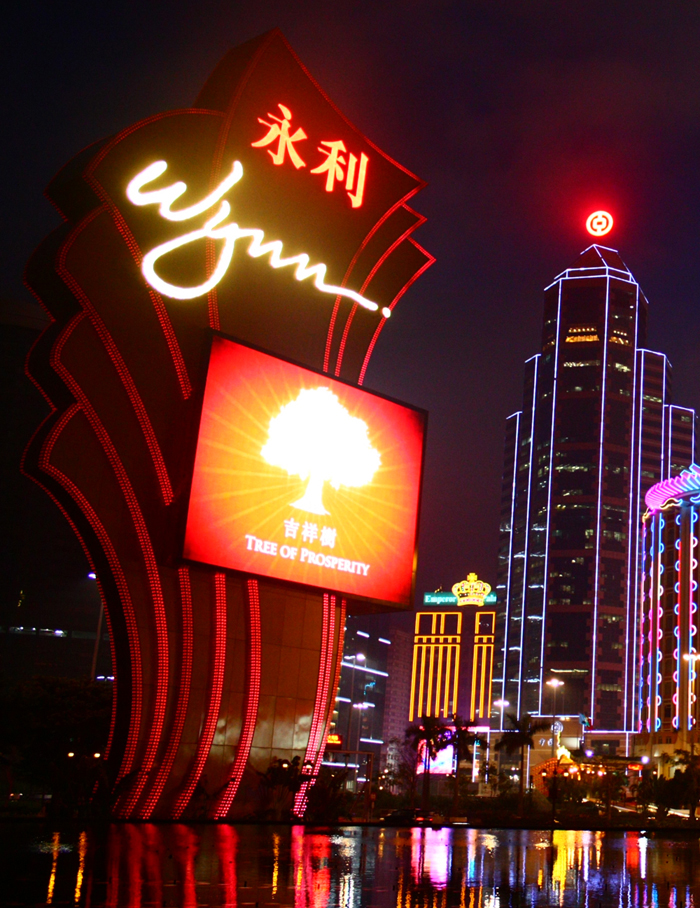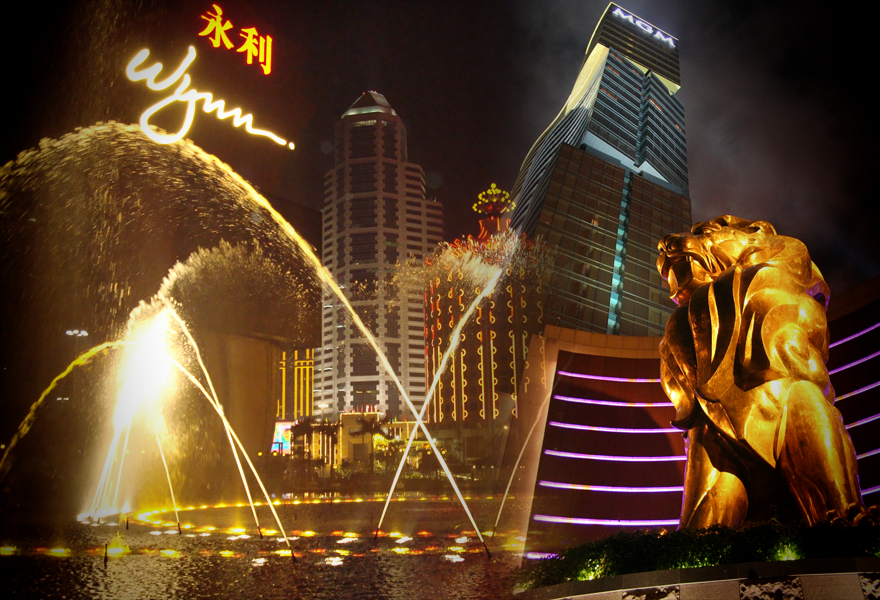There were big developments this week at two of the gambling world’s titans: MGM Resorts International (MGM) and Wynn Gaming (WYNN). Below, a recap of this week’s news and what it means for investors:
1. MGM Reports 2011 Earnings
 MGM reported full-year 2011 earnings on Wednesday morning, disappointing investors, as the stock slid 4.5% for the week. MGM lost 21 cents per share on an adjusted basis, an improvement over the previous year’s fourth quarter, but below analyst expectations of a 20 cent per share loss.
MGM reported full-year 2011 earnings on Wednesday morning, disappointing investors, as the stock slid 4.5% for the week. MGM lost 21 cents per share on an adjusted basis, an improvement over the previous year’s fourth quarter, but below analyst expectations of a 20 cent per share loss.
There was some good news, particularly on the top line, as the continuing rebound in Las Vegas tourism helped MGM properties, which include the Bellagio, Mandalay Bay, and CityCenter operations. REVPAR (revenue per available room) rose 13% in Las Vegas for the full year compared with 2010, as MGM filled more rooms at better rates. Casino win, entertainment revenue, and food and beverage sales all rose modestly as well.
The star for MGM was its new MGM China joint venture, which contributed $1.5 billion in revenue – nearly 20% of MGM’s full-year total – in just seven months. For the full year, EBITDA (earnings before interest, taxes, depreciation, and amortization) from the property was 27% of the company’s total. MGM owns 51% of the joint venture, with Pansy Ho – daughter of Macau magnate Stanley Ho – owning a sizable stake and the remainder floated on the Hong Kong Stock Exchange. (Its ticker symbol is HK.2282.) MGM China plans to build another location on the Cotai Strip, at an estimated cost of between $2 and $2.5 billion USD, according to its fourth quarter conference call.
Management was certainly very optimistic on that call, even if Wall Street did not seem to share their rosy outlook. CEO Jim Murren mentioned strength in the convention business, in both slot and table gaming play, and agreed that “mid to high single digit” growth in 2012 REVPAR was a “reasonable” target. “The market will have a better year” in 2012, Murren noted at the end of the Q&A session, pointing to higher visits and higher revenue per visit for the Las Vegas market as a whole.
Beyond the good news, though, there are still major issues with MGM stock. The 2011 loss was the fourth straight for the stock on an annual basis, as the company still works to recover from the effects of the 2008-09 recession. The company’s debt load continues to be a worry, closing the year at $13.6 billion, or twice the company’s market capitalization at Friday’s close of $14 per share. MGM has been cash flow positive since 2009, but has not generated nearly enough cash to cover the interest on its debt, let alone to reduce the debt balance. The company has managed to refinance much of its debt at slightly lower costs, but the company still paid over $1 billion (with a ‘b’) in interest alone in 2011.
There is a still a long road ahead for MGM to overcome its past mistakes, notably the disastrous CityCenter property, which was constructed as the Las Vegas market was collapsing. The $8.5 billion property, in which MGM owns a 50 percent stake, continues to struggle. The property lost $500 million in 2011 (half of which is attributable to MGM) after a $1.1 billion loss in 2010. So many of the development’s condominium units remain unsold that MGM has turned to leasing them out; Chief Design Officer Bobby Baldwin touted that strategy in the conference call, noting that 405 units were leased for total monthly revenues of $751,000. The fact that management is even mentioning a $9 million annual revenue stream in a nearly $9 billion project, whose interest costs alone were $190 million in 2011, show what a disappointment CityCenter has been.
Analysts are still very bullish on MGM stock; according to Reuters, 19 of 30 analysts covering the stock rate it a “Buy” or better. As CalvinAyre.com’s Jamie Hinks noted this week, Deutsche Bank analysts reiterated their own “Buy” rating on Thursday. “We continue to believe the 2012 recovery story is intact,” wrote Carlo Santarelli and Kelly Knybel.
The analysts may be correct; but a 2012 recovery will not be enough to create value for shareholders. Even given that recovery, and continued growth in Macau, few analysts believe MGM will be profitable in 2012 or 2013. The problem is that a stock like MGM is perfect for the models often used by Wall Street analysts. High leverage and solid top-line growth play well with Wall Street, which can extrapolate those numbers to argue that by 2015 or 2016 the company will return to pre-crisis earnings levels.
But MGM simply fails the common sense test. This is a company that will be unprofitable for six full years. It is a company whose interest costs are over 15% of its market capitalization. As a point of reference, 2011 interest expense alone was over $2 per share, and the current net debt load – total debt minus cash – is $24 per share. And just how stable is the company’s growth story? Given the still-tenuous global recovery, should investors jump headfirst into a tentative rebound in Las Vegas? And how will the company’s current Macau operations fare amid increased competition? The models will work – if MGM executes flawlessly. Given its recent track record, and the number of challenges facing the company, investors must be as optimistic as management to take that risk.
There is only one sensible way to play MGM – through its Hong Kong-listed subsidiary, MGM China. That stock escapes the debt load associated with the US properties: the company has $720 million in cash, with debt of just $552 million, according to MGM China CEO Grant Bowie on the conference call. The new Cotai property will no doubt change the balance sheet, but investors should choose a better-capitalized, less debt-heavy operation in Macau over a highly indebted company exposed to the still-uncertain Las Vegas market. MGM China is at a five-month high after strong year-end earnings of its own, yet still trades at just 16 times earnings and recently authorized a special dividend with a yield of 5.9%. Better balance sheet, higher growth, and income potential; MGM Grand is well worth the currency risk and (usually) higher expense associated with foreign stocks. Any way you look at it, the Hong Kong subsidiary is the better stock.
2. Wynn Buys Out Okada
 The dramatic fallout between former partners – and friends Steve Wynn and Kazuo Okada reached a new crescendo as Wynn Gaming bought out Okada’s stake for $1.9 billion last weekend. Okada has filed a restraining order attempting to prevent the action but has been removed from his board seats on both Wynn Gaming and Wynn Macau.
The dramatic fallout between former partners – and friends Steve Wynn and Kazuo Okada reached a new crescendo as Wynn Gaming bought out Okada’s stake for $1.9 billion last weekend. Okada has filed a restraining order attempting to prevent the action but has been removed from his board seats on both Wynn Gaming and Wynn Macau.
Wynn stock actually rose 4.8% on the week, probably due to the fact that Okada’s $2.7 billion stake will likely be redeemed over 10 years for a total of just $1.9 billion. The $800 million difference is worth about $8 per share to the rest of Wynn’s shareholders, and likely accounted for much of the stock’s $5-plus move for the week.
The question going forward is whether the flap will reflect poorly on Wynn Gaming or its CEO, and whether the dueling investigations will cause any legal blowblack on the company and its stock. Right now, it appears unlikely. As Reuters noted, the cases against both Wynn and Okada brought by their rivals look unlikely to cause any real legal repercussions. Wynn’s $135 million donation to the University of Macau was hardly an “under-the-table” payout – the company announced the gift in a press release and held a public ceremony commemorating the occasion – while it’s unclear that Okada is even subject to the US anti-corruption laws he allegedly broke.
It seems likely that this episode, while entertaining to gambling insiders, is unlikely to have further material effect on Wynn stock. As the legal dust settles, a settlement between Wynn and Okada – perhaps a still-forced liquidation at a price closer to that of the market – seems the most likely outcome. Within six months, the Wynn-Okada duel will be just another line in the biographies of two of the gambling world’s more colorful characters. As I argued last month, WYNN is still one of the best plays in the gaming sector, and a solid long-term play on the growth in Macau. The feud between Wynn and Okada – though entertaining – seems unlikely to change that.
